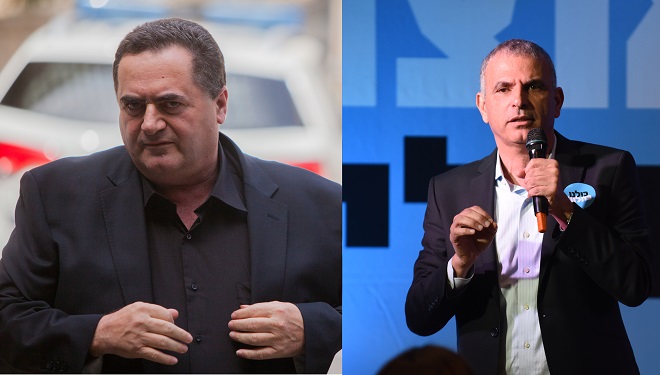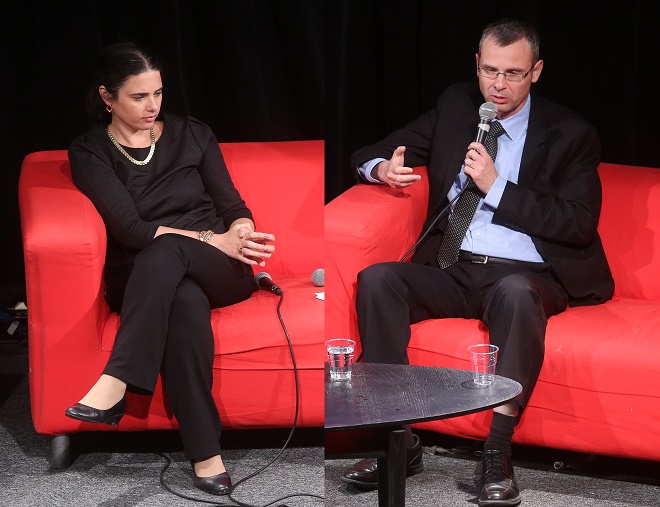With the renewal of coalition negotiations, Mida would like to make its own proposals for (realistic) best candidates in the top ministries.
Now that Pesach is over and coalition negotiations have resumed, we at Mida decided to chime in and decided to make our own recommendations for the next government · We present to you Mida‘s dream team, designed to ensure security and prosperity for Israel

With Israeli coalition negotiations still ongoing, we at Mida decided to look at the issue ourselves, and see who would be the best candidates for the challenges Israel faces. Our “dream team” is obviously imperfect: Adam Smith, Carl von Clausewitz and James Madison are sadly unavailable, so we focused on politicians with a reasonable chance of getting in.
Defense
In our opinion, the IDF’s most important task right now is to renew its doctrine and go back to the tried and true principles of maneuver, seizure of territory and decisive engagements. This means changing the training curriculum of senior officers, building a large and effective ground force and equipping it with modern tanks and APCs which will allow it to act in this direction.
The main candidate for Defense Minister, Moshe “Bogie” Ya’alon, is one of the chief culprits for the present sclerotic condition of the IDF. As we described extensively in Mida, Yaalon tried to inculcate new ideas into the IDF during his tenure as regional commander and Chief of Staff (CoS), including negating the idea of decision as a military objective and advocating instead for “containment” and “burning of (the enemy’s) consciousness.” As CoS, he also oversaw a massive reduction in forces (including closing an entire armored brigade—the 500th), and included his post-modern military thinking into operational military plans. The most obvious result was the stinging failure of Second Lebanon.
Yaalon continued this approach in his tenure as Defense Minister: cutting beyond what budgetary demands required, restoring the post-modern approach in warfare to the IDF, and running a military campaign based on ineffective attrition, “containment” and the avoidance of military decision.
Another candidate, even if less realistic, is Yoav Galant, Head of Southern Command during Cast Lead and a candidate for CoS until his candidacy was torpedoed by Attorney General Weinstein. Galant’s approach to military affairs is certainly what the army needs: militarily, Cast Lead revolved around the classic doctrine of taking the fight to the enemy and conducting maneuvers. Galant aimed to move deep into enemy territory, including encircling Rafah to cut off Hamas’ tunnel lifeline. He explicitly stated that the IDF “can conquer the strip” in an interview in Maariv on Septermber 30, 2008. Indeed, Cast Lead was called off for political reasons, not military failures.
Such use of force derives from “our operational approach, that we need to go anywhere we need to” (interview with Channel 2, November 8, 2006), and that “if you stop attacking the enemy, he’ll surprise you in the end.” Then-Defense Minister Amir Peretz noted that Galant “kept seeing a need to conduct a large-scale military operation,” and Galant has even been credited with saying that “there’s no such thing that the Qassamim can’t be defeated.”
Politically, Yaalon’s position in Defense seems assured. He’s a part of the ruling party, and since the head of Galant’s party (Kulanu) was already promised the Finance Ministry, his chances of getting the equally important Defense portfolio are minimal. It’s also hard to deny that Yaalon does have some advantages, including more experience in the army and in politics. How does the army saying go? That’s what we’ve got, and that’s what we’ll win with.

Foreign Affairs
Since Prime Minister Netanyahu will probably handle the main aspects of foreign policy himself, primarily in dealings with the United States and Europe, the main job of the next Foreign Minister will be largely administrative, and the challenge he or she faces will be improving the Israeli Foreign Service and the manpower at its disposal. Most importantly, the power of the foreign ministry’s workers union in determining appointments must be curtailed, the quality of the diplomatic corps improved and the goals and methods of Israel’s diplomats redefined.
What the Foreign Ministry needs right now is an effective administrator with experience at the head of a government office, loyal to the government and willing to butt heads with the entrenched interests of the permanent staff. In doing so, the minister will likely face widespread and negative media coverage, so the minister in question needs to be able to whether such storms.
Politically, the relevant candidates are Naftali Bennet, Gilad Erdan, Yuval Steinitz and Silvan Shalom.
Naftali Bennet has many advantages. He is independent-minded and decisive. He understands what needs fixing at the Foreign Service and can shake things up there. The fact that his public image is based on fighting the old, staid elites could be an advantage in fighting off the counterattacks of the same.
On the other hand, his ideological positions could hamper his room for maneuver, a must for any diplomat. Worse: he could end up clashing with a Prime Minister he finds to be “left-wing” and “apologetic”. His non-ministerial conduct during Protective Edge raises questions about his ability to remain loyal to the government and coalition line. In the sensitive position of Foreign Minister, such conduct could be disastrous.
Gilad Erdan might be a good choice. His ministerial record shows he is capable of changing large and complex bureaucracies, as well as face populist and media attacks like those he endured when reforming the Broadcasting Authority. As a staunch Likud man loyal to Netanyahu, Erdan will act entirely in line with government policy. He is inexperienced in foreign affairs, but if he works closely with Netanyahu, this is easily corrected.
Among the four candidates, Yuval Steinitz and Silvan Shalom have a clear edge in the experience department. Shalom has already served as Foreign Minister, he has international recognition and he could provide a moderate face for a hawkish government. Steinitz has also acquired much important experience as Finance Minister and Strategic Affairs Minister. He understands Israel’s security issues well and is a sought-after analyst at international security think tanks. He conducted international-level talks when Israel was being accepted into the OECD as well as financial issues related to the United States. Steinitz is also thoroughly knowledgeable on the Iranian issue, having served as the Prime Minister’s emissary on the subject.
However, both Steinitz and Shalom lack the wherewithal to conduct structural changes in the system. As loyal Likud members, they will follow the government line well, but they will not be able to conduct the personnel changes we consider necessary.

Finance
The primary goal of the Finance Minister should be advancing a growth-oriented policy: removing regulations and barriers, easing imports and competition, and making Israel a market-friendly country. Although reducing government spending is also important, reducing government intervention is more pressing.
This time, there is a choice of good candidates. Moshe Kahlon, the leading candidate, has his heart in the right place. He understands the importance of free markets, the burdens caused by monopolies such as the ports and the Electric Company, as well as the damage caused by the Histadrut to the labor market. His planned reform of the Israel Land Administration is long overdue.
Unfortunately, Kahlon also has a populist side to him. During the elections, he spoke of an “economic catastrophe we’re heading towards,” and took a populist stance regarding the workers fired from Israel Chemicals and other workers’ struggles. His desire to fight artificial monopolies has sometimes led him to “tycoon hatred” and unfortunate statements on the individual accumulation of wealth.
Such a hostile atmosphere can harm entrepreneurship and investment in Israel, and if it becomes policy could be a genuine strategic-level problem. When you add the power he possesses as the possessor of the balance of coalition power, the fear of populism becomes a real one. Regardless, if Kahlon is head of the Finance Ministry, the Knesset Finance Committee should be chaired by a Likud member to balance him out.
Another relevant if less likely candidate is Likud’s own Yisrael Katz. Katz may not have much specific economic experience, but as Likud’s go-to guy in developing infrastructure and fighting extortionist public monopolies, he could serve as a kind of Ministerial Emissary of Netanyahu, who would be the Super-Finance Minister. His political loyalty would ensure financial stability for the next four years.

Justice
The main challenge of the Justice Minister is to rein in the Supreme Court’s activism and that of the governmental legal advisors. This is a difficult and challenging task, which requires an in-depth understanding of legal issues as well as an ability to withstand overwhelming institutional and media pressure. Nevertheless, it does not require flashy, wholesale reforms. A few small steps to gradually improve the situation will do just fine.
The relevant candidates are Yariv Levin and Ayelet Shaked.
Levin has clear advantages: he has a legal education, knows the system well, has a wealth of experience in parliament as well as in the politics of appointments in the justice system. He understands the problems presented by the Supreme Court to the separation of powers and governance in Israel. However, he lacks the public and professional weight which previous Justice Ministers brought to the table. Facing such challenges, the personal authority of the Justice Minister can be decisive.
Another candidate is Ayelet Shaked, who will aim to fill Jewish Home’s dream position. The fact that the ideological right sees the justice system as a primary obstacle to its mission will give Shaked and her party the energy and drive to make deep changes within it. However, although she could be given advice by right-wing think tanks who will happy to work closely with her, the fact that she lacks relevant experience and knowledge can be a problem.
There is of course another option: appointing an external Justice Minister, a customary move for this kind of position. Netanyahu appointed Prof. Yaakov Ne’eman twice for the job, and Prof. Daniel Friedman also has unfinished business at the Ministry. Friedman, a man with significant authority as a legal scholar, could be just what the government needs to advance the necessary changes.
There are other government ministries which face serious long-term challenges:
In Education, there’s a pressing need to open the door to excellence and private education, a mission that Ze’ev Elkin, who supported intellectual elitism and achievement in an interview with Mida, is well-placed to do. Ayelet Shaked could also theoretically succeed here, but her exaggerated attachment to the budget-hungry National-Religious sector could stand in her way. The obsession of some members of her party for “values” and “Jewish education” also draw attention away from the system’s most pressing needs.
When it comes to Internal Security, a determined and serious minister is needed to shake things up and turn Israel’s law enforcement system into an effective and efficient tool of governance. This job could be good for Naftali Bennet, Yoav Galant and perhaps Avi Dichter.
We don’t know how big the government will be, and goodies may be handed out generously until everyone is satisfied. If you ask us, we think some ministries should either be scaled back or shut down, mostly those responsible for transfer payments such as welfare and health, and sectorial interests such as agriculture. In addition, it’s not at all clear that we need separate ministries to handle national infrastructures, energy and housing. Since no-one is asking us, we can only hope that these minor ministries are at least put in the hands of capable people.
Bottom line, there are worthy candidates for all positions. We can only wish Prime Minister Netanyahu luck in getting them in the right place.
English translation by Avi Woolf.
To receive updates on new articles in English, join Mida on Facebook or Twitter or join our mailing list.



